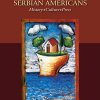The Serbian Institute is a Washington based think tank, a public policy research institution whose mission is to educate the public and communicate information through multimedia aimed at promoting a better understanding of Balkan issues, and to broaden the parameters of public policy debate based on principles of equality and objectivity. SI relies on private financial support from individuals, foundations and corporations for its work.
.Serbian Institute Position Statement
- May 10, 2013 -
We believe in strengthening, defending and promoting Serbian and democratic values, principles and interests through nonviolent political and social dialogue and activism. We support fair and equal treatment of all Serbian people, which cannot be attained without ample representation of Serbian views to the public, academic institutions, media and governing institutions that guide US foreign policy. We believe that the Serbian population throughout the world, of which the Serbian Institute is a part, should play a major role in promoting the future prosperity and progress of the Serbian people in the Balkans. We believe that the future prosperity and cultural identity of the Serbian people will be attained by developing a more effective, unified, consistent and powerful international voice in conveying their legal, territorial and historic rights.
The Serbian people have sacrificed their lives for centuries for liberty and to defend their rights and attain equality. But today, much more can be achieved through effective communications, strategic planning, political action and constructive diplomacy. The Serbian Institute aims to become an effective voice in explaining Serbian views to key audiences including governments, scholarly institutions, international business communities and the media. The Serbian Institute supports policies and solutions that best represent the interests of the Serbian people wherever they may live, including values and principles stated as follows, independent of (but hopefully in congruence with) positions of current or future political leadership in Serbia and Republika Srpska.
General Principles
Democracy: We support the strengthening of all democratic institutions in Serbia and wherever Serbian people live in the Balkans, and support the democratic development, rule of law and equality in all territories of the Balkans.
Cultural Identity: The Serbian language and alphabet as well as the overall Serbian cultural identity must be preserved and nurtured among all Serbian communities in the Balkans and internationally.
Territorial Integrity: We support the territorial integrity of Serbia within its present borders which includes Kosovo, Vojvodina and all other constituent parts and the right and obligation of Serbia, as every other state, to defend its sovereignty, territorial integrity and its citizens.
Anti-corruption: We support all legal actions aimed at eliminating corruption and illegal, unfair business practices everywhere in the Balkans.
Return of Refugees: We support the right of return for all refugees to their homes, their right to decide where they wish to live, and to legal and equal treatment of their right to private property.
Links





